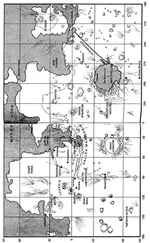• • •
Frank spent this time setting up the head Department of Mars offices in the town, which one day was christened Sheffield. The Burroughs staff protested the move, but he ignored them. He spent his time meeting with American executives and project managers, all at work on various aspects of the elevator or Sheffield, or the outlying Pavonis towns. Americans represented only a fraction of the workforce on hand, but Chalmers was kept busy nevertheless, because the overall project was so huge. And Americans appeared to be dominating the superconducting, and the software involved with the actual elevator cars, a coup that was worth billions and which many people gave Frank credit for, though it was in fact his AI and Slusinski who were responsible, along with Phyllis.
Many of the Americans lived out in a tent town east of Sheffield called Texas, sharing the space with internationals who liked the idea of Texas, or had just ended up there randomly. Frank met with as many of them as he could, so that by the time the cable touched down they would be organized and working with a coherent policy— or under his thumb, as some of them put it. But happy to be there, as long as it gave them any clout. They knew they were less powerful than the East Asian commonwealth, which was building the elevator car shells, and less powerful than the EC, which had constructed the cable itself. And less powerful than Praxis, and Amex, and Armscor, and Subarashii.
• • •
Eventually the day came when the cable was going to touch down. A giant crowd gathered in Sheffield to see it; the train station concourse was jammed to well over capacity, as it had a good view along the rim to the base complex, popularly referred to as the socket.
As the hours passed, the end of the black column drifted downward, moving more and more slowly as it approached its target. There it hung, not that much bigger than the leader line guiding it down, smaller in fact than the business end of an Energia rocket. It stood up into the sky perfectly vertically, but it was so thin and the foreshortening was so severe that it looked not much longer than a tall skyscraper. A very skinny tall skyscraper, walking on air. A black tree trunk, taller than the sky. “We ought to be right under it, down on the floor of the socket,” one of his staff said. “There’d be headroom when it stops, right?”
“Magnetic field might scramble you a bit,” Slusinski replied, never taking his gaze from the sky.
As it got closer they saw that the cable was knobbed with various protrusions, and filigreed with silver lines. The gap under it got smaller. Then the end of it disappeared into the base complex, and the seashell roar of the crowd in the concourse grew louder. People watched the TVs closely; cameras inside the socket showed the cable come to a slow halt, still ten meters above the concrete floor. After that came the tweezerlike movement of gantries, and the clamping of a physical collar around the cable, a few meters up from its end. Everything happened in dreamlike slow motion, and when it was done it looked like the round socket room had suddenly gained an ill-fitting black roof.
Over the loudspeaker system a woman’s voice said, “The elevator is secured.” There was a brief cheer. People moved away from the TVs and looked out the tent walls again. Now the object looked much less strange than it had when hanging out of the sky; now it was nothing more than the reductio ad absurdum of Martian architecture, a very slender, very tall black spire. A beanstalk. Peculiar, but not so unsettling. The crowd burst into a thousand conversations, and scattered.
• • •
And not long after that, the elevators were working. During the years when the cable was extruding from Clarke, robots had been spidering along it, constructing the power lines, safety cables, generators, superconducting pistes, maintenance stations, defense stations, position-adjustment rockets, fuel tanks, and emergency shelters that marked the cable every few kilometers. This work had proceeded at the same pace as the cable construction itself, so that soon after touchdown the cars were running up and down, up and down, four hundred of them going in each direction, like parasites on a strand of hair. And a few months after that, you could take an elevator into orbit. And you could take another elevator down out of orbit, to the surface.
And down they came, transported from Earth by the fleet of continuous shuttles, those big spaceships that boomed around the Earth-Venus-Mars system, using the three planets and Luna as gravity handles, fielding madly accelerating ferry packets from Earth and Mars. Each of the thirteen operating ships held a thousand people, and they were full every trip out. So there was a continuous stream of people docking on Clarke, descending in elevator cars, and disembarking in the socket. And then pouring into Sheffield’s concourses, wild and unsteady and bug-eyed as they were herded with some difficulty to the train station, and onto trains outbound. Most of these trains then emptied their loads into the Pavonis tent towns; robot crews were building the tents just fast enough to house the influx, and the completion of two new pipelines had secured the water supply, which was being pumped up from the Compton Aquifer beneath Noctis Labyrinthus. So the emigrants settled in.
Back in the socket, on the other side of the cable, upbound elevator cars were being loaded with refined metals, platinum, gold, uranium, and silver. Then the cars swung in and locked onto the piste, and up they rose again, accelerating slowly to their full speed of 300 kilometers an hour. Five days later they arrived at the top of the cable, and decelerated into locks inside the ballast asteroid Clarke, now a much-tunneled chunk of carbonaceous chondrite, so filigreed with exterior buildings and interior chambers that it seemed more a spaceship or a city than Mars’s third moon. It was a busy place; there was a continuous procession of incoming and outgoing ships, and crews perpetually in transit, as well as a large force of local traffic controllers, using some of the most powerful AIs in existence. Though most of the operations involving the cable were computer controlled and robotically accomplished, entire human professions were springing up to direct and oversee all these efforts.
And of course media coverage of all the new imagery was immediate and intense; and all in all, despite the decade of waiting, it seemed that on touchdown the elevator had sprung into being like Athena.
• • •
But there was trouble. Frank found that his staff was spending more and more time dealing with men and women from the tents, who had come into Sheffield and right into their offices, new arrivals who were sometimes nervous, sometimes loud and angry, rattling on about crowded living conditions or insufficient police or bad food. One bulky red-faced man wearing a baseball cap shook a finger at them and said, “Private security companies come in from tents higher up and offer protection, but they’re just gangs, it’s just extortion! I can’t even give you my name or our security might find out I came here! I mean I believe in the black economy as much as the next guy, but this is crazy! This isn’t what we came here for.”
Frank paced his office, seething. These kinds of allegations were clearly true, but difficult to verify without a security team of one’s own, a big police force in fact. When the man left, he grilled his staff, but they could tell him nothing new, which made him even angrier. “You’re paid to find these things out for me, that’s your jobs! What are you doing sitting around in here all day watching Terran news!”
He canceled a day’s appointments, thirty-seven meetings in all. “Lazy incompetent bastards,” he said loudly as he stalked out the door. He went to the train station and caught a local downslope to have a look for himself.
Читать дальше
Конец ознакомительного отрывка
Купить книгу












